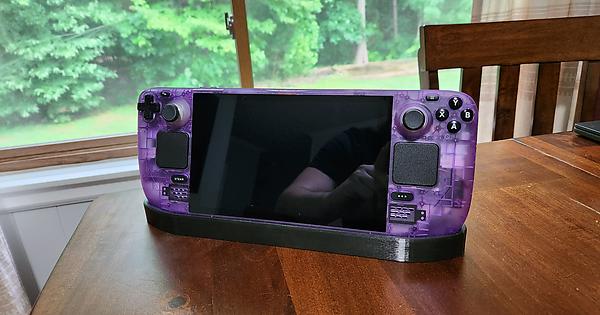man, those shells are slick. was it tricky at all to do the swap?
was it tricky at all to do the swap?
I’m probably not the best person to answer this for the general public, as I have a fair bit of experience with disassembly, repair, and mods to handhelds - I’ve got several old Nintendo handhelds, a GPD Win 2, and a GPD Win Max that I’ve had open at some point or another, along with some experience doing the same for friends.
As such, I did it with proper tools from iFixit and not the ones that came in the kit.
With that context though, it was probably one of the easiest/least finnicky handhelds I’ve ever disassembled. The most nerve-wracking part was moving the screen over, which is something I’ve never had great success with until my Deck. A hair dryer + lots of patience, worked out nicely.
The standard shell on the steam deck can be a bit creaky if you put pressure on certain points. How’s the new one?
I’ve never noticed any creaking from mine, before or after the swap. Any specific pressure/motions you can think of that I should try?
Twist it like an ice cube tray to see if it pops out.
dang it, did it too hard and all the bits fell out.
now I’ve got 1s and 0s all over the place and it’s your fault
Seems like people aren’t a big fan of sardonic humor anymore, but I enjoy it. Have an upvote lol
I don’t know how statistically prevalent it is, and where you’d get it varies. Sounds great that you don’t have to deal with it either before or after.
For me initially it was around the usb port when I press down on it. Nowadays, I get it when I do a twisty motion with both hands while holding it, but I’ve had it for well over a year, and it has experienced a couple of bumpy falls in the meantime.
Mine creaks when I squeeze the right grip a certain way. Nothing terrible, but noticeable.
Same! In the exact same spot as well (right grip)
Taking the screws out and re-torquing them correctly seems to fix that, at least it did for me.
Haven’t noticed any creaking or flexing on my original deck either.
Overall, do you think it was worth it? I love the look but am worried about damaging my deck (I’m fairly experienced with computer and phone repair, but there’s always the chance of damage) and being unhappy with the end result.
I think I may just go with the back cover from Jsaux and call it a day.
It was 100% worth it for me, but I have several handhelds that I have disassembled numerous times and have proper tools, so I wasn’t expecting any big trouble. I decided beforehand that I wasn’t going to swap the touchpad covers or the buttons, because I think they look cheap and bad. So that simplified concerns about the touchpads being fragile and/or hard to modify.
My process was to watch extremeRate’s howto before buying, and then weigh the risks as such:
- Assuming no carelessness, what’s likely to break?
- Screen
- Trigger hinge(s)
- How much do they cost?
- $70
- $20 (each)
And since I can afford ~$110 it would cost if I broke both triggers and the screen, it would be sad if I broke it, but not a huge problem.
And … I love it. I keep looking at it and just being floored that it’s mine.
- Assuming no carelessness, what’s likely to break?
Looks sexy AF bro!
I fully agree
Oh wow, I didn’t realize extremerate was making these. I bought one of those clear backs but a whole shell swap might be in order. How long did it take and how difficult was it?
It took me around 3 hours, because I was following along with their guide (skipping the part where they removed the cooler from the motherboard for some reason). I could have probably done it much faster without the guide, honestly - The important stuff to see was how to attach various sticky bits (mesh and such) to the new shell. I’d say most of that time was pause/watch/unpause of their video, even at 2x speed.
As for difficulty, I’m probably not the best person to answer that for the general public, as I have a fair bit of experience with disassembly, repair, and mods to handhelds - I’ve got several old Nintendo handhelds, a GPD Win 2, and a GPD Win Max that I’ve had open at some point or another, along with some experience doing the same for friends.
As such, I did it with proper tools from iFixit and not the ones that came in the kit.
With that context though, it was probably one of the easiest/least finnicky handhelds I’ve ever disassembled. The most nerve-wracking part was moving the screen over, which is something I’ve never had great success with until my Deck. A hair dryer + lots of patience, worked out nicely.
Now that I’ve done it once, I could probably do it again in about 30 minutes.
Are you now permanently aroused?
69% aroused, 420% of the time
How’s the grill on top handling heat? Mine cracked in several spots after just a week or two of use.
So far it’s fine but I’ve only had it a couple days
You’re a lot braver than me. Hope you enjoy it!
I certainly do!
How does this compare to a shell swap on the Switch? I’ve done my switch twice, but that’s all of my experience with taking electronics apart. The deck intimidates me, but damn do I want that see-through case. I have both a game boy and my switch in clear pink, and I want the set.
I’ve never actually done a Switch shell swap, but based on watching a couple shell swap videos, it actually looks much simpler to do the Deck shell swap. A lot fewer tiny, fiddly components to manage.
The main thing I’d suggest is to watch Taki Udon’s video on it, it might help you get a better sense of how easy it is - I found it quite helpful, even just knowing that I didn’t have to take the cooler off the APU like ExtremeRate was suggesting was quite helpful.
Is it as hard as they say?
I would do this in a heartbeat if I didn’t already have a skin and case on mine, it would be pointless :(
I considered getting a skin, but I assumed it would have the same problem all the other device skins I’ve ever applied end up having: Peeling, bubbling, and looking cheap+amateur.
A full case swap on the other hand, and this thing looks like it could have come from the factory that way.
Yeah the original skin I had was a nightmare to install but looked okayish after it was done. Looks great in a case, though (it’s the Killswitch case so it comes with a cut-down version of the skin that just covers the front a bit)
I fully agree otherwise- I have an atomic purple Switch with the Extremerate shells and it looks fantastic. They make good stuff.
I was kinda interested in a Killswitch, but ultimately decided I’d rather it be naked
What method did you use to remove the screen? Taki Udon said the included pry tools weren’t very good, did you use those? Did you end up marring the black paint on the bezel like him? How difficult was the screen removal? Was it super scary?
I’ve got experience repairing Apple products, so i could probably handle this, but I’m not sure it’s worth the risk.
yeah, I saw his video and was glad to see the warnings - it was actually really helpful in my swap. It’s because of him that I chose to just use my iFixit Pro Tech toolkit, and completely ignored the tools they included in the shell swap kit.
I used a hair dryer for heat, heating on its “high” and “slow” settings, just going around the edges for about 3-4 minutes, re-heated when it felt necessary.
iFixit’s suction cup has a very nice handle that doesn’t budge even with a fair bit of force, and I used the blue plastic triangle opening picks that come in the iFixit kit for the process of actually prying up the screen and severing the adhesive.
As a result, that process didn’t scratch the black paint on the bezel, at all.
There’s a ‘hook’ tool that comes in the kit (I think it’s called the halberd spudger?), which I used to very carefully peel away the adhesive from the screen backing without scraping or even touching the paint. The adhesive strips just kinda stuck to the side of the hook and curled up.
I wouldn’t say it was difficult, just nerve-wracking as I’ve never been successful with removing adhesive screens. The main thing, as Taki suggested, is just to be patient and not get in a hurry. So I’d say not hard, just slow.













